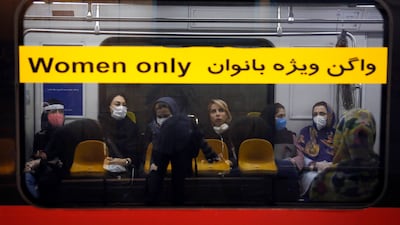Restrictions on women's freedoms in Iran are tightening as authorities plan to bar women who refuse to wear the hijab from the Tehran Metro.
Tehran municipality announced it has formed a security unit to stop women without a head covering from entering the capital's light rail network.
“We will proceed according to the country’s laws in this regard. Our first step is issuing notices, then we issue warnings to the unveiled women, and in the third stage we prevent them from entering the metro stations,” said Tehran Mayor Alireza Zakani.
There were nationwide protests following the death of Mahsa Amini, a Kurdish woman who died in morality police custody after her arrest for allegedly wearing her hijab improperly.
Her death prompted the biggest street protests in Iran for years. Those resulted in the deaths of more than 500 people and at least 18,000 were arrested.
Many women have openly defied Iran's dress code since then as a mark of rebellion against authorities, with hijab-burning a feature of many demonstrations, while authorities have promised stricter rules.
Universities are to bar female students who do not wear the hijab from many services, the government announced this month, days after the judiciary chief promised to prosecute women who defy the hijab regulations “without mercy”.
Authorities sealed thousands of businesses across Iranian cities in the past few weeks, including restaurants, cafes, tourist accommodation, shops and a counselling clinic, in response to women’s refusal to wear the hijab, Iran International reported.
Social media users this week posted videos of women passing through metro stations without a hijab, while others were seen being turned away at the gates by uniformed guards and women in chadors.
They were only allowed to pass once they put on a headscarf.
“As if Mahsa Amini was only killed six months ago for not wearing her hijab,” said one traveller.
Curtains have also been installed between men's and women's carriages on the metro, which officials said will be fitted on all trains “within the next few weeks”.
Extra staff have also been sent to health clinics to enforce rules as part of “chastity and hijab units”, Farsi media reported.
Clinic managers and municipality staff must remind patients and their companions of the “command” to wear hijab, Radio Farda said, while reports are to be sent to Tehran authorities on the “status of the hijab in the city's clinics”.


